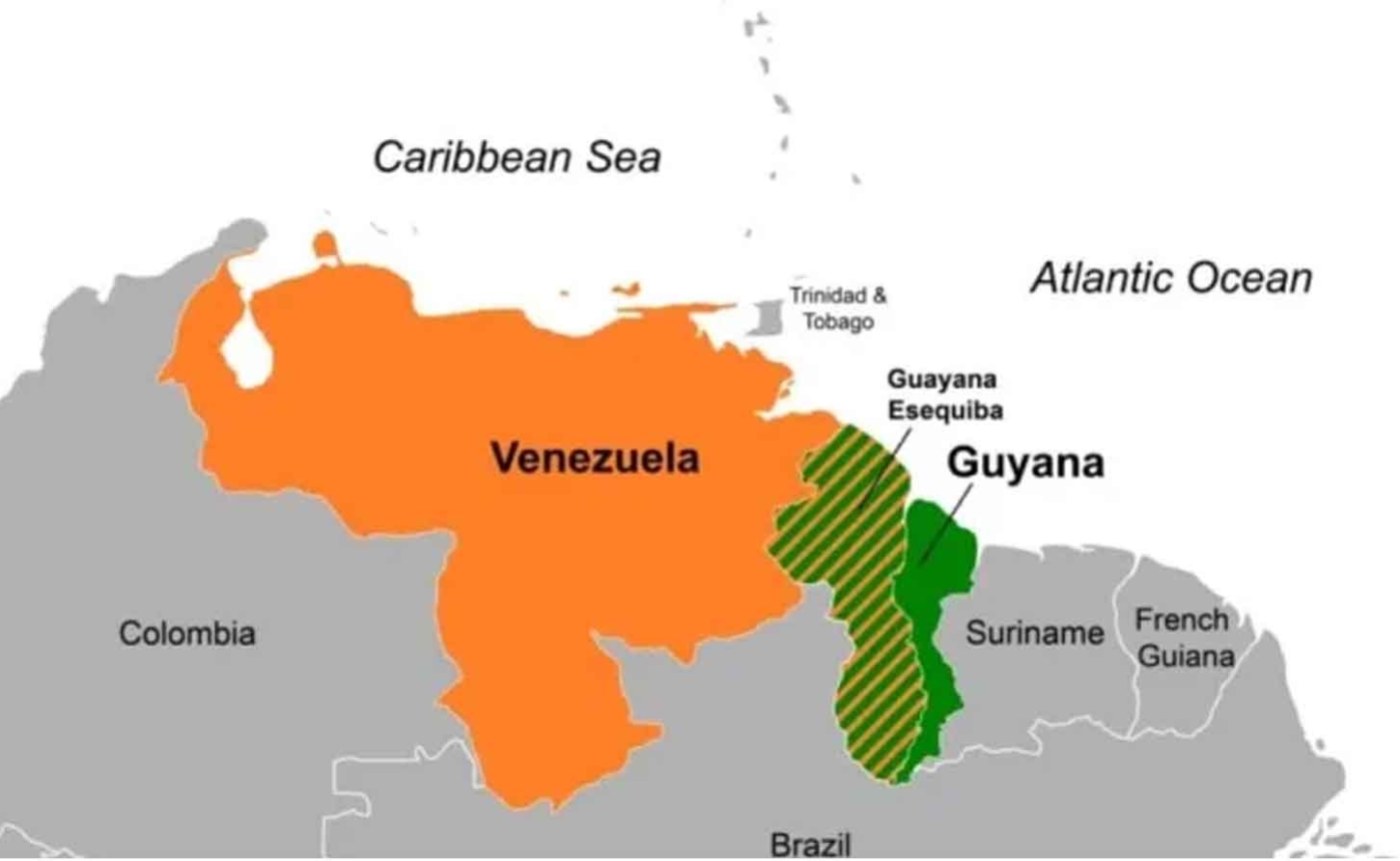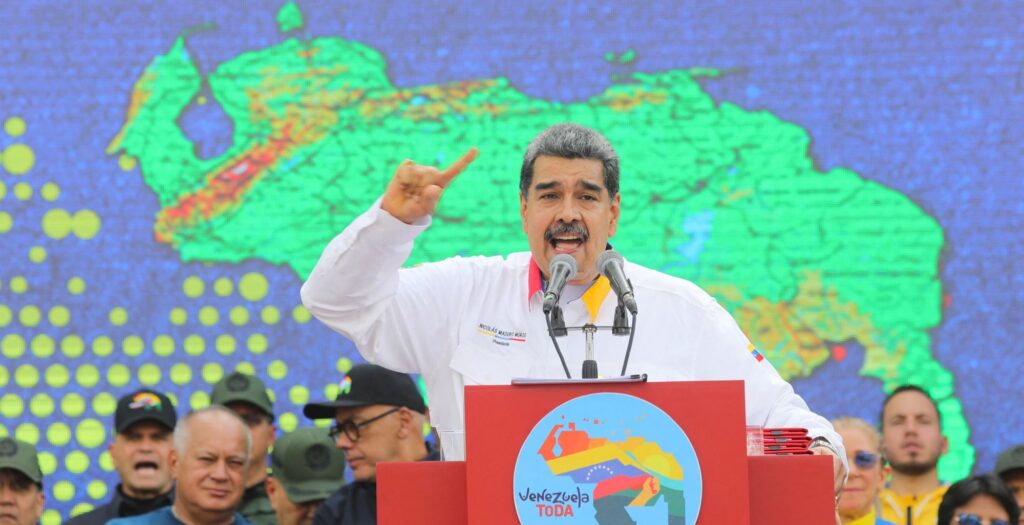GUYANA | Labor Movement Called to Defend Guyana as Venezuela Defies ICJ with Elections

GEORGETOWN, Guyana, May 9, 2025 - Calvin G.Brown - In a brazen display of territorial ambition, Venezuela's Maduro government is proceeding with elections in Guyana's disputed Essequibo region on May 25, directly flouting a recent International Court of Justice ruling that explicitly prohibits such action.
The gravity of this threat has sparked urgent calls for Guyana's labor movement to spearhead a nationwide, non-partisan mobilization—one that extends beyond political divisions to unite citizens, diaspora communities, and Caribbean neighbors in defense of Guyanese sovereignty.
The National Electoral Council (CNE) announced that for the first time, elections for governors and regional deputies will be held across 24 Venezuelan states—with Essequibo controversially included among them. The disputed territory, currently administered by Guyana, will vote together with Caracas for representatives, according to Venezuelan authorities.
Maduro's government has declared that eight deputies will represent Essequibo in Venezuela's National Assembly, and voters will select a governor for the region. Yet the announcement comes shrouded in ambiguity, with critical logistical questions left unanswered as the electoral deadline looms.
The CNE has no formal registry of Essequibo voters, despite announcing the inclusion of the region just last month. With approximately 100,000 inhabitants according to a 2012 census (compared to Venezuela's 745,000 registered voters), authorities have failed to clarify how many Guyanese citizens might be eligible to participate in the Venezuelan election.
 With barely three weeks remaining until election day, the electoral framework remains skeletal at best. The CNE has provided no details on the number or location of ballot boxes, electoral zones, or voting colleges. Even the towns that will participate remain undefined—highlighting the fundamental contradiction at the heart of Venezuela's electoral ambitions: how does one hold elections in territory one doesn't control?
With barely three weeks remaining until election day, the electoral framework remains skeletal at best. The CNE has provided no details on the number or location of ballot boxes, electoral zones, or voting colleges. Even the towns that will participate remain undefined—highlighting the fundamental contradiction at the heart of Venezuela's electoral ambitions: how does one hold elections in territory one doesn't control?
"This move by Caracas is little more than a symbolic act," explains Ricardo De Toma, researcher at the Federal University of Roraima and author of a book on Brazilian geopolitical interests in the region. "To guarantee sovereignty, you must ensure there is no other sovereign actor. And that's the conflict taking place today: a dispute between two entities that consider themselves sovereign over the territory."
The Essequibo region—a vast 159,500 square kilometer area west of the Essequibo River—has been the centerpiece of a territorial dispute dating back to colonial times. Guyana has controlled and administered the territory since 1899, when the Paris Arbitral Award established boundaries largely favoring then-British Guiana. Today, Essequibo functions as part of six of Guyana's administrative regions, with the country's sovereignty over the area remaining uninterrupted for over 125 years.
Venezuela's legal justification for the elections stems from a controversial domestic referendum that approved incorporating Essequibo as a Venezuelan state. President Maduro subsequently enacted the "Organic Law for the Defense of Guyana Essequiba," which formalizes treating the disputed territory as Venezuelan.
The legislation outlines a transitional period until elections determine a governor, with Venezuela's National Assembly legislating for the territory in the interim. It also provides for a provisional government headquartered in Tumeremo, near the disputed border.
Meanwhile, Guyana's mining stakeholders have rallied behind the ICJ's intervention. The Guyana Gold and Diamond Miners Association (GGDMA) welcomed the court's May 1 order as "a critical step in Guyana's efforts to preserve its sovereignty and territorial integrity." The ruling reinforces a previous December 2023 directive that prohibited Venezuela from taking actions that might escalate tensions over the resource-rich territory.
The GGDMA emphasized that "no Venezuelan electoral activity is currently taking place in the Essequibo and will not take place," underscoring their firm stance in defense of Guyana's territorial claims. The organization highlighted the mining sector's vital economic role in the region and pledged continued support for peaceful resolution through lawful international mechanisms.
The territorial dispute is notably asymmetric in nature. Venezuela, with a landmass nearly four times the size of Guyana and already possessing extensive Atlantic coastline, seeks to acquire even greater maritime access through control of Essequibo. This power imbalance adds another dimension to what many observers view as a classic case of a larger nation attempting to expand at its smaller neighbor's expense.
For Guyana, the stakes could not be higher. Essequibo constitutes roughly two-thirds of Guyana's current territory. Should Venezuela succeed in its territorial ambitions, Guyana would be left with a fraction of its present landmass—a diminished state that many experts question could remain economically viable.
“ JCI Guyana, along with its powerful West Indies Jaycees Senate body replete with its organisational structure and its Caribbean reach and influence, could be considered perfectly poised to join the labour movement in Guyana in mobilizing the region in defence of the people of Guyana and its very real extential threat by neighbouring Venezuela. ”
The region contains not only valuable mineral deposits that drive Guyana's mining sector but also significant portions of its agricultural land and natural resources. The loss would effectively cripple the small nation, potentially rendering it unable to function as a sovereign state in any meaningful capacity.
Labor leaders across Guyana are uniquely positioned to orchestrate the necessary resistance. Unlike political parties whose motives might be questioned, the labor movement—with its grassroots reach and organizational infrastructure—can mobilize citizens without the taint of partisan politics. What's required is nothing less than a national coalition that transcends traditional divides to present a unified Guyanese front.
JCI Guyana, along with its powerful West Indies Jaycees Senate body—replete with its organizational structure and its Caribbean reach and influence—stands perfectly poised to join the labor movement in this critical effort. The combination of labor's domestic strength and JCI's regional networks could create a formidable alliance capable of mobilizing support throughout the Caribbean in defense against what represents a very real existential threat to Guyana's sovereignty.
"This is no longer about politics—it's about national survival," said one prominent union representative who requested anonymity. "The labor movement has historically united Guyanese across ethnic and political lines. Now we face an existential threat that demands that same unity."
As election day approaches, Venezuela's determination to proceed with voting in Essequibo not only challenges international law but raises troubling questions about regional stability. With two nations claiming sovereignty over the same territory—and one now attempting to manifest that claim through electoral politics—the stage is set for a diplomatic confrontation that extends well beyond the ballot box.
The existential nature of this threat demands a response that transcends traditional political divisions. Guyana's labor movement—with its deep grassroots connections and mobilization capabilities—stands uniquely positioned to rally the country in defense of its territorial integrity.
Unlike political parties, whose efforts might be dismissed as partisan maneuvering, labor organizations could spearhead a truly national resistance movement free from political skepticism.
This mobilization must extend beyond Guyana's borders to include its substantial diaspora communities and fellow CARICOM nations. A coordinated, non-partisan Caribbean response would signal to Venezuela—and the world—that Essequibo's defense represents more than a bilateral dispute; it stands as a regional imperative.
Only through such unified action can Guyana hope to counter Venezuela's territorial aggression and preserve not just a piece of land, but its very existence as a viable sovereign state.
-30-
